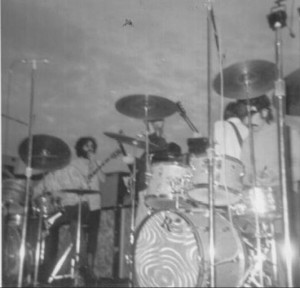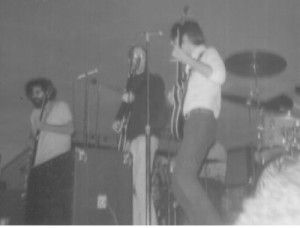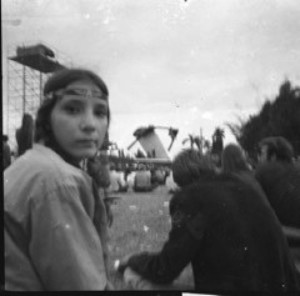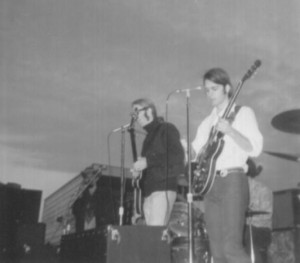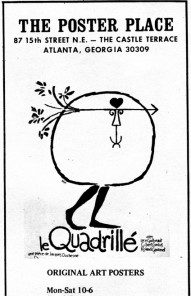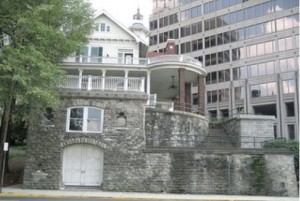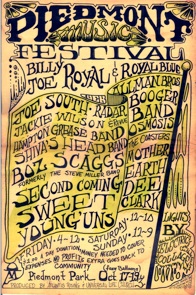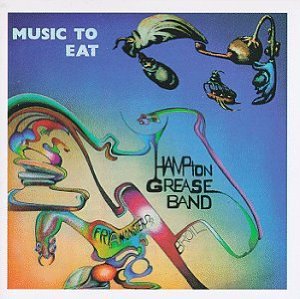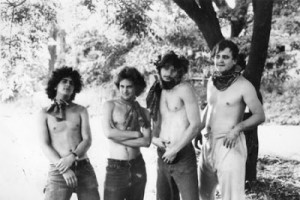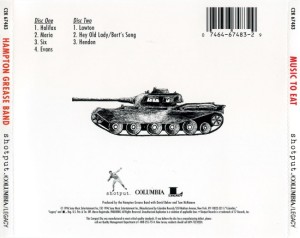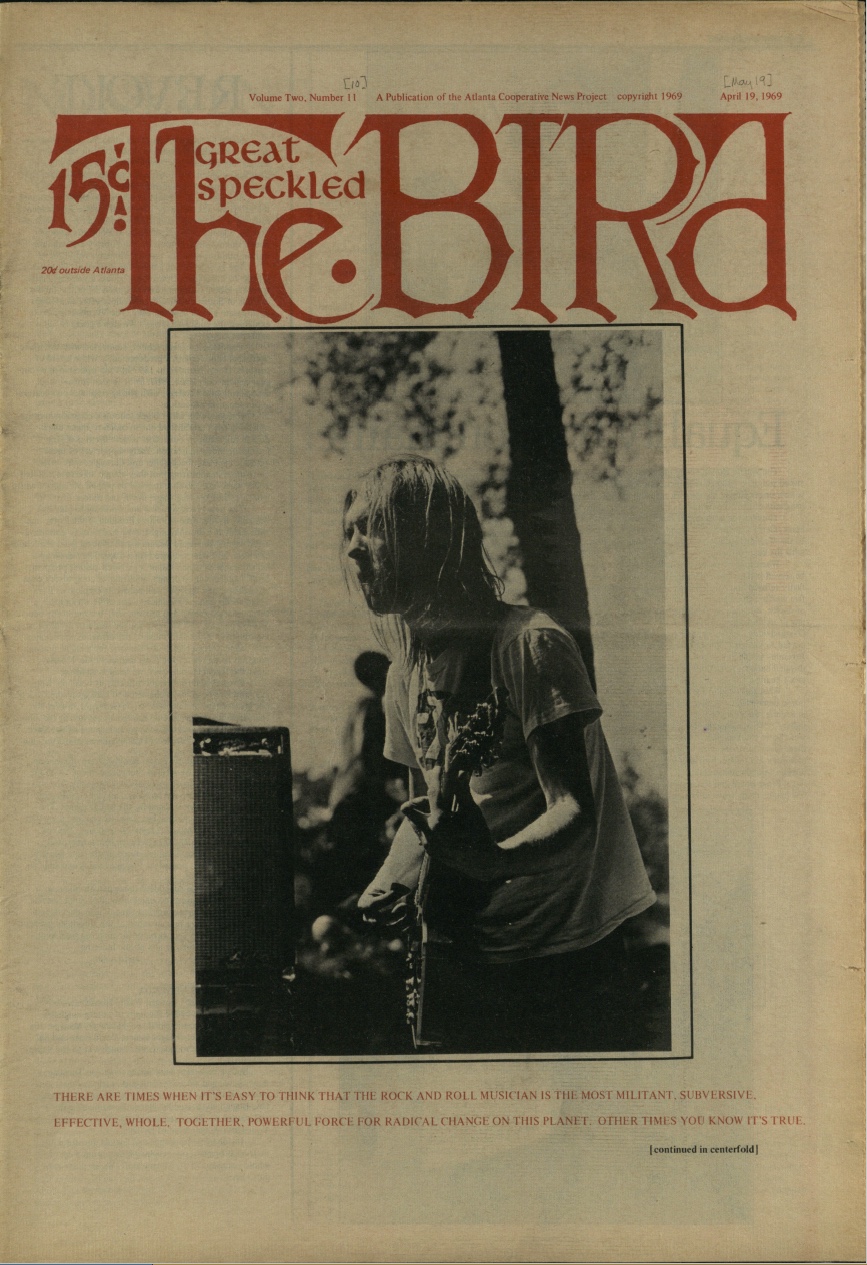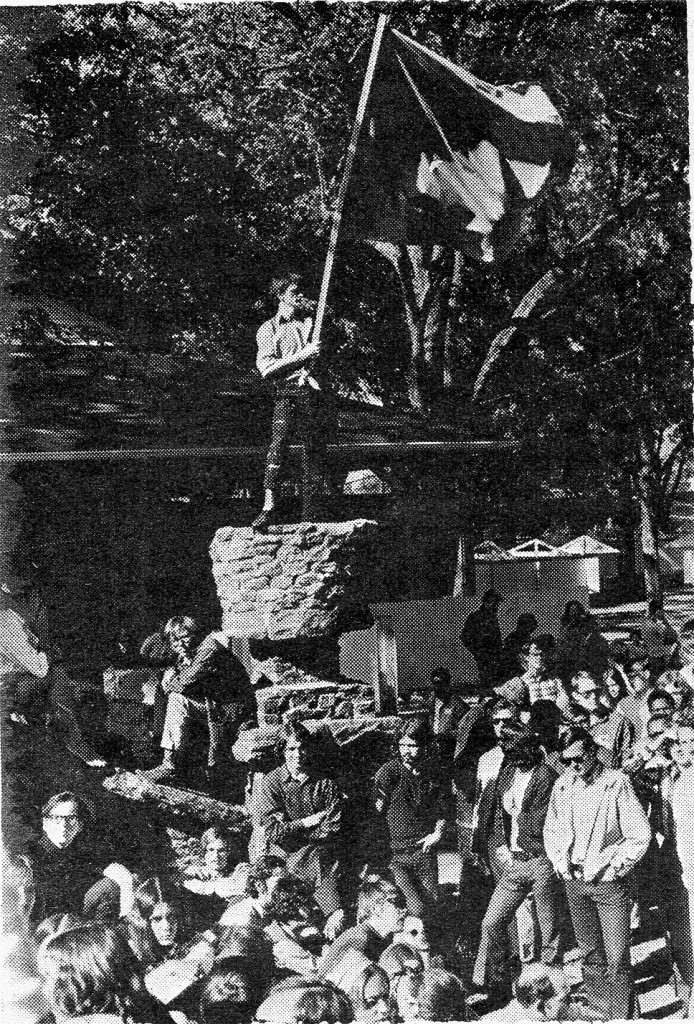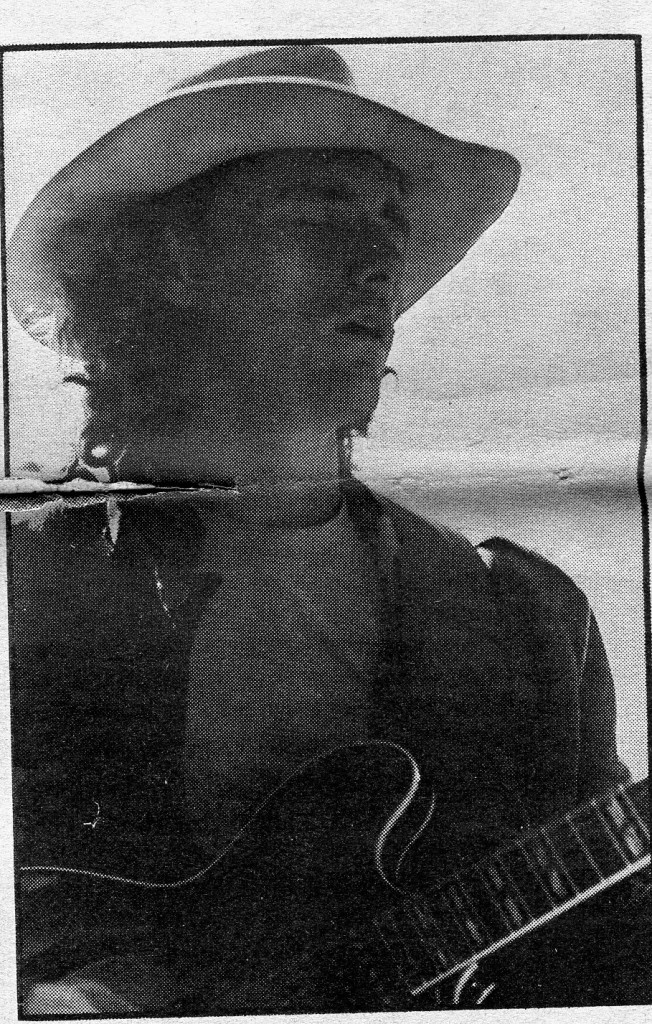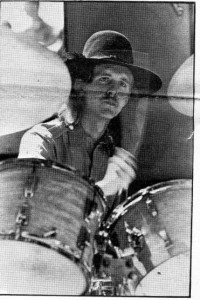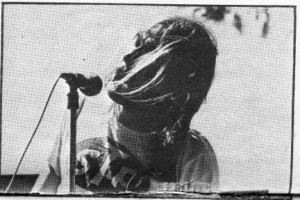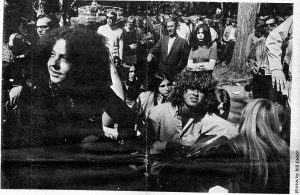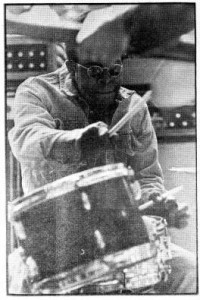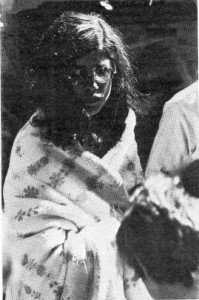(c) 1998 Patrick Edmondson (Excerpted from a longer work in progress)
After High School graduation, Gabi had moved to Atlanta to start Georgia State just as Fred was planning to do while living with his benefactors, Uncle Paul and Aunt Evalene. Gabi’s sister, Pixie, had an apartment off North Peachtree so she didn’t have to look for apartments for rent. I was going to be nearby at Oxford, a small country town east of Atlanta, in the fall.
Pixie realized that with Gabi came me, her boyfriend. Pixie drove her light blue Dodge dart down to Oxford almost every weekend to get me for her sister Gabi, then drove us back on Sunday night. Often we gave rides to other weirdoes I was meeting at Oxford. Pixie didn’t suspect that she had become a stop on the hitchhiker’s trail through Oxford.
We had become friends with Dan del Vecchio at Oxford. His brother Jeff had hitchhiked down to visit him. Dan and Jeff are both skinny. Jeff is tall; Dan is medium like me. Dan wears an old-fashioned tuxedo coat with split tails. Jeff has wide glasses and was just out of the Navy and still wore navy bells. They both went to Atlanta and of course came by Pixie’s. Jeff Del Vecchio came by one Sunday and seemed to really tickle Pixie’s fancy, which was great as she had been so down for so long.
December 1968 I had finished one quarter of Oxford and returned home to scandalize Tifton and my father. Gabi of course came with me. We, also of course, came prepared to turn on our old high school buddies and spread the enlightenment.
Meanwhile Pixie had to move, but would not look for a place. Then she called for Gabi and me to come help her move. We came up and went through want ads and called at pay phones and drove around. Finally she found a place in Decatur. Some poor old lady had split off the up stairs of her house on Adams Street, but never knew what was up when she rented to Pixie, her mother and Gabi. A hint should have been when everything besides furniture was just carried in big sheet bundles.
I had to get the family car home for Christmas. We had been talked out of sending for tickets to the Monterey Pop Festival the previous June, so when our Oxford friend Jan Jackson had heard about a similar music festival in Miami at Christmas and had volunteered her boyfriend from UGA, Martin’s VW bus as transportation, we mailed off for four tickets. The day after Christmas, Martin, Jan, and Gabi were to drive to Tifton to pick me up for the trip to Miami in Ol’ Baby, the faithful blue VW bus into which Martin had built a double decker bed.
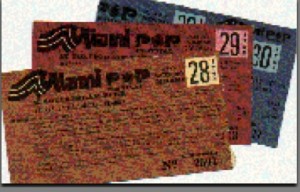
My parents and siblings were very curious when Ol’ Baby pulled into the carport and Gabi and this couple got out. I was surprised to see Jeff DelVecchio and another guy, Mike Smith, also climb out. Seems they had heard of the festival and being inveterate hitchhikers had headed to Atlanta. They surprised Mrs. Ujhelyi when they came knocking at Adams Street late at night. Now they were in the mix and Jan also had promised a woman from Oxford we’d stop by Leesburg, Fla. and pick her up to go to Miami.
Thus was our merry band to be. Later we would be joined by a woman from Miami Mike had planned to see. She ran away, sort-of, to go with us. Later they got married and came to Atlanta to honeymoon at a big hotel and called Gabi and I to “get stoned and fuck up the plot of Streets of San Francisco on this big color TV with us to celebrate”. We’d already fucked in sleeping bags beside each other in the Indian Reservation dump; kinda creates a special bond.
Almost as soon as we pulled out of our driveway Martin asked Jeff,” Where did you hide that acid?”
“Up here in the light. All the grass is in the toolbox.” He answered from the top bunk. After this exchange I was aware I was leaving Kansas.
We were passing around a joint as we headed down I-75 at a steady purring 55 – 60 mph. Gabi and I took turn chattering like magpies, stoned ones at that, in the bottom bunk. We had been apart for a few days so had lots of information to exchange. We were almost two receptors of the same brain it seemed at times.
The radio stations came and went. It rained and the windshield wiper on the passenger side stopped. Martin told Jeff to bang on it. He did until he broke the windshield, which annoyed Martin a bit. I had brought Rolling Stone. I had subscribed and got my copy early. It was on groupies. I believe we all read it cover to cover over the trip since it was the only reading material we had.
Finally we turned off to pick up Laura. Her suburban parents eyes were filled with horror at the thoughts of her getting in that bus even with Gabi and Jan, but they were polite. I do believe she inhabited both Jeff and Mike’s sleeping bags before we returned her home.
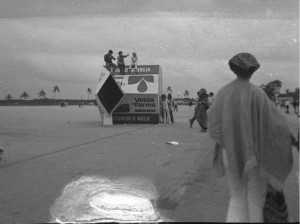
We drove into Miami and called some friends of someone. They directed us to meet them at Coconut Grove which was full of hip shops and people. Stopped to see Michael Lange, who someone knew, at his head shop. We bought a leather headband and bag he had made. He later ran another festival in Miami then the Woodstock festival.
We sat in the sun under palm trees and watched the people flow. Later we worked our way back to a campground nearer the festival spot. The people were very wary of our crew checking in to a family campground. Little did they know of the collecting invasion forces.
Awoke, used showers and went searching for a Huddle House for breakfast. Martin has high metabolism and must eat regularly. Then we went and got high to await the start. We then waited outside the racetrack at Hialeah for the gates to open. Martin starts talking to a man by a van. He is a professional photographer and gets to drive his van of cameras inside. He invites us all for the ride. We saw him all through the festival and saw pictures we’d seen him take in Rolling Stone. We were quite impressed.
The festival began at 1PM and lasted until 10PM each day for three days. Saturday December 28th Jose Feliciano, Procol Harum, Buffy Sainte Marie, Country Joe and the Fish, Three Dog Night, Chuck Berry, The Infinite McCoys, Booker T and the MGs, Fleetwood Mac with Peter Green, Pacific Gas and Electric, The Blues Image.
Some acts performed more than one day. Also some brand new groups were slotted in as The Amboy Dukes with Ted Nugent still an acidized hippie in tight velvet pants. The ads said “a thousand wonders and a three day collage of Beautiful music”. That was an understatement. There was a stage on the racetrack with all the seats then another stage way out in the parking lot. You could walk from one and be at the back or plan ahead and be right at front for special acts.
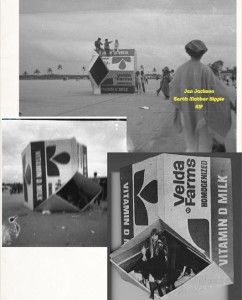
Art works from the Coconut Grove art school had been strategically placed throughout the grounds. Tripping people were constantly discovering them and getting hung up in examining the art and never leaving its tiny alcove in the hedges for hours.
There were milk cartons like kids use at school, except made of plywood and so big the mouth is a full size door entrance. We were walking one time and saw a group of people collected around one and we could hear music. Joni Mitchell and Jimi Hendrix were playing acoustic guitars and harmonizing. Duane Allman, then unknown except to Georgians, watched from the crowd.
When Joni later performed at the fest Hollies singer-songwriter Graham Nash, whom Joni had met through their mutual friend, David Crosby, accompanied her. Joni’s account
But we were in a hurry to see County Joe and the Fish, of whom we were big fans, for the first time.
Later we found out Hendrix was involved in the financing of this festival and held one of his own at this raceway later in the spring of 1969. His other partners in putting on this one got emboldened by the great success and started planning one at home in New York state where they were from. They later did it as Woodstock.
Also Duane Hanson http://arted.osu.edu/160/18_Hanson.php had his realistic looking people in unusual places to be found. Once I’m stumbling along with the crowd which parts and leaves me hanging over the most realistic bloody motorcycle wreck!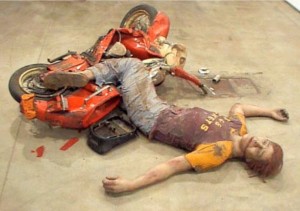
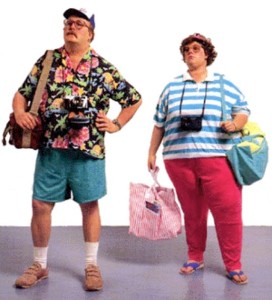
Then there were the stereotypical old tourist couple standing and pointing out something.
Most performers hung around the grounds and enjoyed themselves as long as they could stay. Other famous people had just come to experience the east coast Monterey.
We realized the campgrounds would probably be filled or closed by the time the crowd exited for the night. We asked around and heard the Indians were coming to the rescue of their brothers the hippies.
Yeah, and scalp them! The Seminoles motioned the line of campers with signs, “camp cheap. This Way.” with an arrow. We should have learned to beware American Indians bearing arrows.
We followed in the dark out into areas looking swamp even in the darkness. Then a campground, but the arrows sent us further. Phantasmagoric sights to exhausted people. Finally. You can stop. Sleeping bags plopped and people were asleep on hitting the ground.
Upon awakening in the morning we found ourselves in the dump for the reservation campground. A garbage filled swamp surrounded this tiny isthmus full of cars. Lots of bugs and we heard gators grunting in the bushes around the water. They would only allow hippies access to a standpipe for water, so no shower. Also wouldn’t allow access to the laundry. Why are hippies so dirty?
Jeff’s experience in naval matters had him direct us to a big marina. We hung outside the clubhouse until we saw a hip looking kid. He let us in and lent us his key so we could get in both genders for showers and hair washing. He left telling us which boat, yacht actually, to return the key. It felt good to wash off the Seminole dump. We were a clean but scraggly still collection of beatniks.
When we returned the key, the kid’s father came out and we thought he would be mad, but he invited us aboard and kept filling a pipe of high quality hash to smoke before we left. Wow, is this world changing or what. We hurried to eat ravenously. Everything, even salt crystals were exquisite in their tastes and textures. As hunger slacked everyone went from wolf to aesthetes enjoying the very essence of the act of eating. And we had a Pop Festival to go yet today!
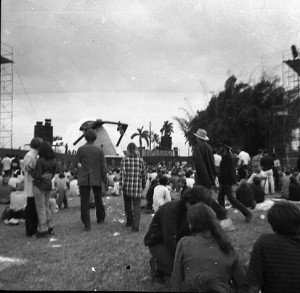
Sunday December 29th Steppenwolf, Marvin Gaye, Grateful Dead, Hugh Masekela, Flatt and Scruggs, Butterfield Blues Band, Joni Mitchell, James Cotton Blues Band, Richie Havens, The Boxtops.
The second night we would not fall victim to Seminole arrows. We went to look for the girl Other Jeff knew. He called and she told us to come quietly. We drove stealthily into the Miami suburbs and cut the engine to drift into the driveway of a split-level suburban manse with a large lawn. Again exhausted sleeping bags deployed.
We awoke to the sun and a small girl walking around looking at us. She ran back into the house and we scrambled to collect ourselves back into Ol’ Baby to make a get away. Before we were successful, the girl returned. “Mama wants to know how many of you want eggs?”
Mom invited us inside and made a big spread. Biscuits, honey, orange juice, eggs, ham, lots of coffee. It was like being home something my mother would do. “Invite your freaky friends in dear and introduce them!” Mom even made sandwiches she put in a pack and handed the women in the group before sending us all off to the festival.
But first we had to make a stop for her teenage daughter to pick up a sack of acid for she and Other Jeff to sell today. I had never knowingly been around tripping people or certainly so many varied drugs, but still Gabi and I were fine with Cannabis forms alone since we didn’t even drink.
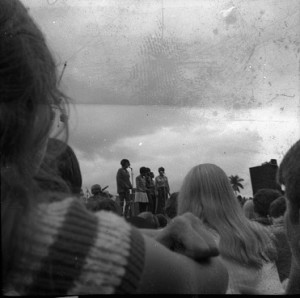
Monday December 30th Iron Butterfly The Turtles, Canned Heat, The Grassroots, Jr. Walker and the All Stars, Ian and Sylvia, Charles Lloyd Quartet, Sweet Inspirations, Sweetwater, The Joe Tex Revue.
The Grateful Dead Miami set (Free download
http://www.archive.org/details/gd68-12-29.sbd.cotsman.5425.sbeok.shnf),
